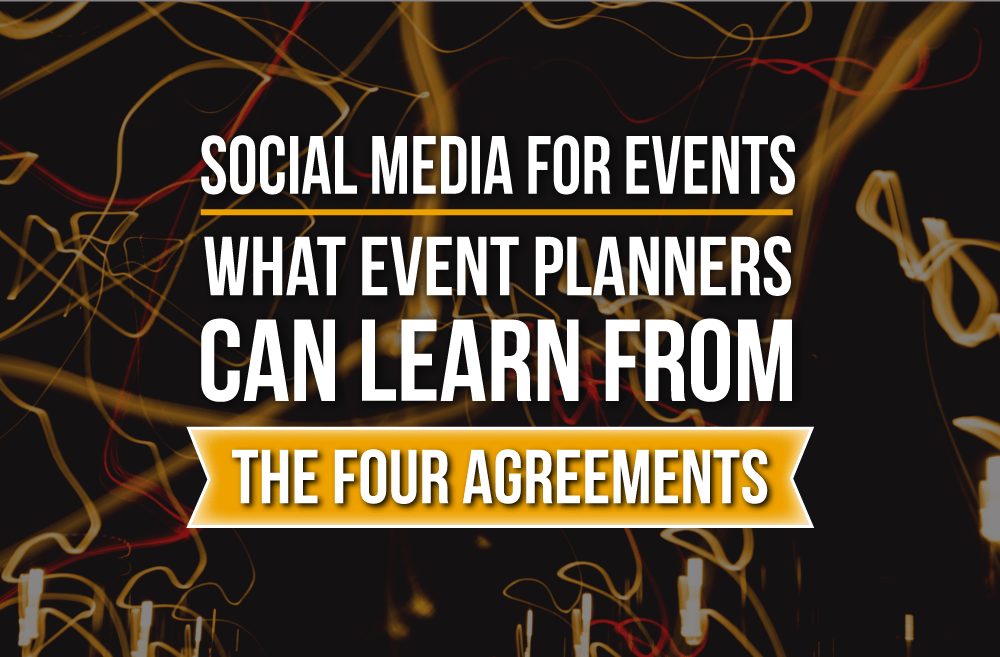When using social media to market your event, first consider consulting The Four Agreements: a set of principles to follow in order to create happiness in life. The agreements are simple, but living by them is difficult. The good news is that you can apply these simple principles to your social media strategy in order to make your event planning process easier, less cluttered, and much more effective.
1. Be Impeccable With Your Word
If you reach a crossroads while determining whether or not to post about your event, ask yourself: Will this content add value to my audience? If the answer is no, you might want to consider tailoring it so that it’s more relevant to the desires and interests of your audience.
Some event creators are hesitant to be social about their event because they are afraid guests will publicly complain. If people are not happy about some aspect of your event, you probably need to make some changes (outside of your online presence). Although it can be disheartening to receive an angry Tweet, be sure to respond to clients the way you’d want someone to respond to your dissatisfaction with their service or product. Take responsibility and show them that you value their opinion by listening (not deleting their comment or ignoring them) and use this as an opportunity to showcase your all-star customer service.
If you’re new to Twitter, make sure that your hashtags are relevant and easy to understand. Also, ensure that your hashtag applies to what you are actually aiming to talk about. There have been mishaps as a result of not knowing the true meaning or context of a hashtag. If you fail to research your hashtag and accidentally misuse it, be sure to openly apologize and own up to your mistake. Although this is a tough (yet easily avoidable) situation, swallow your pride and your followers will generally be forgiving.
2. Don’t Take Anything Personally
Although you might see the value in creating social media accounts for your event, others will be skeptical. Your boss or teammates might dis or belittle the importance of social media. This can be frustrating, especially if the criticism is coming from ignorance or a lack of knowledge on the subject. When a situation like this arises, have no fear and don’t take it to heart. To address any future concerns or questions from skeptics, start by explaining a couple of key facts to them. 60% of buying decisions are already made before your customer even talks to you. 74% of online adults use social networking sites. That’s a large amount of guests that are searching for content about your event. It’s your job to make sure they find stellar testimonials, photos, tweets, and likes. This can result in them registering for your event before you even meet them!
3. Don’t Make Assumptions
My friend told me Pinterest is great, I’ll just quickly create an account. Everyone’s on Facebook, so I’ll inevitably have more guests if I create a Facebook page. I’m not sure I’ll have the extra time to manage the new Twitter account, but just having an account shows that I’m tech-savvy! If you find yourself muttering any of the previous statements to yourself, you’ll need to reevaluate your social media goals and stop making assumptions. Making assumptions about your audience’s involvement on social media can lead to disaster and will hurt your event. To avoid disappointment, ask yourself: Who is my audience and where do they spend most of their time? Then, ask yourself: Are my competitors using social media? If the answer is yes, then ask: Which channels are they on and how are they engaging with our audience? Take the time to answer these questions honestly. If you’re unsure of our audience’s involvement, then refer to research regarding demographics of key social networking platforms.
4. Always Do Your Best
Social media can be used to enhance your event by generating leads, helping you to advertise discounts and promotions, and engaging with your community. However, stellar results usually don’t just occur overnight; it takes time to foster relationships and develop a voice. If you’re having trouble organizing your social media channels, Hootsuite is a great management tool that allows you to manage multiple networks and profiles at one time.
In addition, measuring your progress by establishing reporting intervals can help you identify which strategies are working and which ones need to be reevaluated. Use a tool like Google Analytics to compare the behavior of social media prospects with the behavior of prospects you gain through traditional advertising methods. Give your social media strategy some time to grow and review trends over a period of weeks (not days). Some numbers worth crunching include: follower growth, engagement rate, and conversion percentages (email sign-ups, leads, sales).
In Conclusion
Social media is a valuable tool, however, the way it is used will depend greatly on your audience. Aim to be honest, considerate, and authentic when posting new content (even if you get into a sticky situation). Some team members might not see the value in utilizing social media for your event, but don’t get discouraged. Instead, listen to their opinion, and then, hit them with the facts! Remember to be patient with your strategy, measure your progress after a few weeks, and evaluate which strategies are effective. When all else fails, eliminate clutter and stress by remembering The Four Agreements.









